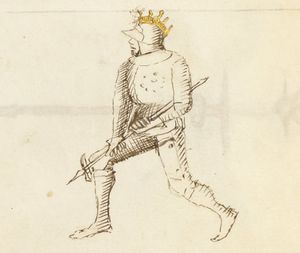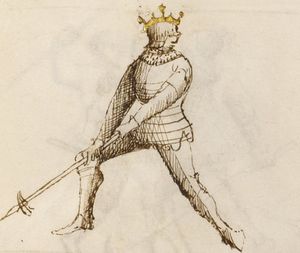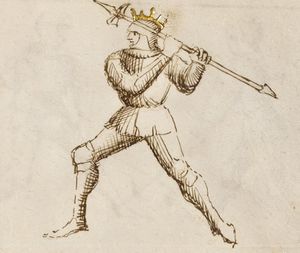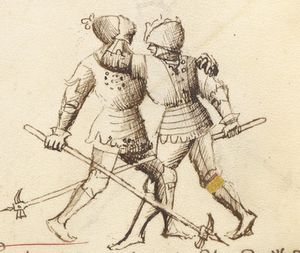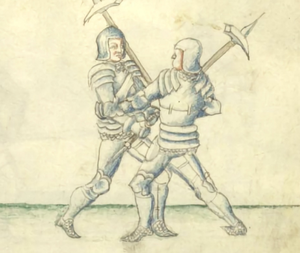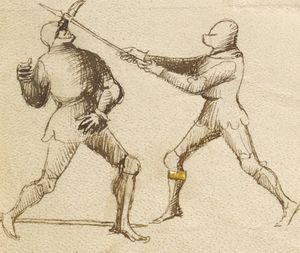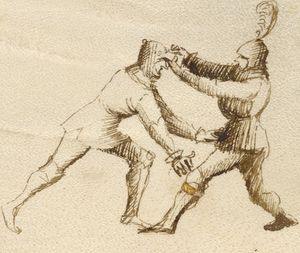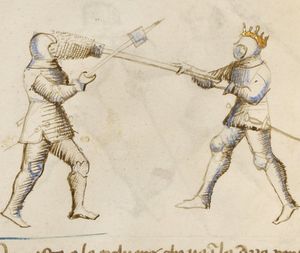|
|
You are not currently logged in. Are you accessing the unsecure (http) portal? Click here to switch to the secure portal. |
Difference between revisions of "Fiore de'i Liberi/Poleaxe"
| Line 9: | Line 9: | ||
! <p>[[Fior di Battaglia (MS Ludwig XV 13)|Getty Transcription]] <span style="font-weight:normal; font-size:85%;">[[[Index:Fior di Battaglia (MS Ludwig XV 13)|edit]]]</span><br/>Open for editing</p> | ! <p>[[Fior di Battaglia (MS Ludwig XV 13)|Getty Transcription]] <span style="font-weight:normal; font-size:85%;">[[[Index:Fior di Battaglia (MS Ludwig XV 13)|edit]]]</span><br/>Open for editing</p> | ||
! <p>[[Flos Duellatorum (Pisani Dossi MS)|Pisani Dossi Transcription]] <span style="font-weight:normal; font-size:85%;">[[[Index:Flos Duellatorum (Pisani Dossi MS)|edit]]]</span><br/>by [[Francesco Novati]]</p> | ! <p>[[Flos Duellatorum (Pisani Dossi MS)|Pisani Dossi Transcription]] <span style="font-weight:normal; font-size:85%;">[[[Index:Flos Duellatorum (Pisani Dossi MS)|edit]]]</span><br/>by [[Francesco Novati]]</p> | ||
| − | ! <p>[[Florius de Arte Luctandi (MS Latin 11269)|Paris Transcription]] <span style="font-weight:normal; font-size:85%;">[[[Index:Florius de Arte Luctandi (MS Latin 11269)|edit]]]</span><br/>by [[ | + | ! <p>[[Florius de Arte Luctandi (MS Latin 11269)|Paris Transcription]] <span style="font-weight:normal; font-size:85%;">[[[Index:Florius de Arte Luctandi (MS Latin 11269)|edit]]]</span><br/>by [[Kendra Brown]] and [[Rebecca Garber]]</p> |
|- | |- | ||
Revision as of 22:10, 27 December 2015
Images |
Images |
PD |
Morgan Transcription [edit] |
Getty Transcription [edit] |
Paris Transcription [edit] | ||
|---|---|---|---|---|---|---|---|
|
[1] The Stance of the Shortened Serpent I am the Shortened Stance, the Serpent, with axe in hand; I am Posta Breve la Serpentina (Short Serpentine Position), I maintain myself better than the others. To whom I give my thrust, the sign will show itself well. This point is strong, for passing through cuirasses (coraze) and breastplates (panceroni).[1] Defend yourself, that I want to try it. |
· Posta breve serpentina ·
[35v-a] ¶ Io son posta breve la serpentina che megliore dele altre me tegno. A chi daro mia punta ben gli parera lo segno. Questa punta si'e forte per passare coraze e panceroni, deffende ti che voglio far la prova. |
[27a-a] Posta breve son la serpentina cum la aça in mano |
[8v-c] ¶ Manibus astringens Jaculum / brevis: en vocor inter | ||||
|
[2] The Stance of the True Cross I am the strong stance called the Cross: I am Posta di Vera Crose (Position of the True Cross), because with a cross I defend myself and all the art of fencing and armed combat defends itself with covers of the armizare incrosare (crossed-weapon armed combat). Attack, because I am waiting for you well, because of that way in which the first student of the Master Remedy of the sword in armour does, and with the pass that thrust with my pollaxe, I can do to you. |
· Posta de vera crose ·
[35v-b] ¶ Io son posta di vera crose, pero che cum crose me defendo. E tutta l'arte di scarmir[!] e de armizare se defende cum coverte dello armizare incrosare. Tra pur, che ben t'aspetto, che zo che fa lo scolar primo dello magistro remedio della spada in arme cum lu modo e cum lo passar tale punta cum la azza mia ti posso far. |
[27a-b] Io son posta forte chiamada la crose |
| ||||
|
[3] [The Stance of the Queen] I am the Stance of the Queen, of pure loyalty: I am Posta di Donna (Position of the Lady) against Dente Zengiaro (Boar's Tooth). If he waits for me, I want to make great strike at him, in which I pass the left foot forward out of the way, and I enter with a fendente to his head. And if he comes with force under my pollaxe with his, then not being able to injure him in his head I will not fail to injure him in his arms or hands. |
[35v-c] ¶ Posta de donna son contra dente zengiaro, Si ello mi aspetta uno grande colpo gli voglio fare, zoe che passaro lo pe stancho acressando fora de strada, e intraro in lo fendente per la testa. E si ello vene cum forza sotto la mia azza cum la sua, se non gli posso ferire la testa, ello no me mancha a ferirlo o in li[3] brazzi o en le man. |
[27a-c] Posta de dona son de lielta pura |
| ||||
|
[4] [The Wild Boar's Tusk/Middle Iron Gate] I am the Boar's Tusk, full of daring: If Posta di Donna (Position of the Lady) is against me, Porta di Ferro Mezana (Middle Iron Door); I know its play and mine. And many many times we have been in battle and with sword and with poll axe. And I say that what she says she is able to do, I can do it more to her than she can do it to me. Also, I say that if I had a sword, and not a poll axe, I would put a thrust in the face, that is, in the striking that Posta di Donna does with the fendente, and I am in Porta d'Ferro Mezana two-handed with the sword, that immediately as it comes, I advance forward (acresco) and pass (passo) out of the way, under his pollaxe with force I enter and immediately with my left hand grab my sword in the middle and place a thrust in his face. So that between our others that of malice is little comparison. |
[The Paris image resembles the Pisani-Dossi.] |
[35v-d] ¶ Si posta di donna a mi porta di ferro mezana e contraria, io cognosco lo suo zogo e'llo mio. E piu e piu volte semo stade ale batagle e cum spada e cum azza. E si digo che quello ch'ella dise de poder fare, piu lo posso far a lei ch'ella lo po far a mi. Anchora digo che se io avesse spada e non Aza che una punta gli metteria in la fazza, zoe, che in lo trar che posta di donna fa cum lo fendente, e io son in porta de ferro mezana cum la spada a doii mane,[5] che subito in lo suo venire, io acresco e passo fora de strada, sotto la sua azza per forza io entro, E subito cum la mia man stancha piglio mia spada al mezo e'la punta gli metto in volto. Si che tra noii altro che de malicia e pocha conparacione. |
[27a-d] Dent de zenchiar son pieno de ardiment |
| |||
|
[5] [The Stance of the Long Tail] I am Coda Longa (Long Tail), against Posta de Fenestra (Position of the Window) I want to do it all the time [so that] I can injure. And with my blows of fendente, beat (sbateria) every pollaxe and sword into the ground, and to narrow play (zogo stretto) strongly I will make. As you find these plays after, I pray you to look at them one by one. |
[36r-a] ¶ Coda longa Io son, contra posta de Fenestra voglio fare de tutto tempo posso ferire. E cum mio colpo di fendente ogni Azza e spada in terra sbateria, E al zogo stretto, forte me faria. Come voii troverete qui gli zoghi di dredo, de guardagli a uno a uno che ven prego. |
||||||
|
[6] [The Stance of the Casement Window on the Left] I am called Posta de Fenestra la Sinestra (Position of the Window the Left). A small arm (brazo) does me on the right. We do not have stability. One and the other certainly feints (falsità), you think that I come with the fendente and I turn a foot backwards and change my position (posta). From being on the left, I enter on the right. And I believe for entering in these plays which come after me I am well ready. |
[36r-b] ¶ Posta de Fenestra son chiamata la sinestra, uno picolo brazo se fa de mi ala destra. Noii non avemo stabilita. Una e l'altra cerca la falsita. tu credera che io vegna cum lo fendente, e io tornero un pe indredo e mi mudero di posta. Li che era in la sinestra, io entrero in la destra. E crezo entrare in gli zoghi che vegneno dredo ben presta. |
||||||
[7] I have beaten your axe to the ground; These are the plays that the guards question. Each one wants to get it, and thinks it has the right. The one who can beat (sbatter) the pollaxe of the companion to the ground, as it is drawn here, does these plays; he will do them all if the contrario [counter] does not cause problems. [In the Getty and Pisani-Dossi, the Master is missing his crown.] |
[36v-a] ¶ Questi sono gli zoghi delli quali le guardie fano questione. Zaschuna le vol pigliare, e crede aver rasone. Quello che po sbatter la azza dello compagno a terra come e qui depento, questi zoghi quello fazza, Tutti gli fara se lo contrario non lo impaza. |
[27b-a] La'tua aça in terra o rebatuda |
[9r-c] ¶ In terram projecta fuit tua nempe tricuspis. | ||||
|
[8] The student puts his axe between the player's legs, and with the left hand he covers his view. And when the player can not see, and wants to turn, he falls to the ground without failing. |
[36v-b] ¶ Lo scolaro ch'a'zza alo zugadore la sua azza enfra le gambe. e cum la man stancha ello gli covra la vista. E quando lo zugador non vede, e se vole voltare, tosto va in terra senza fallare. |
||||||
[9] I have come from the Boar's Tusk with my axe, Also the student which is before me can do this play when he is in close, as you can see. He puts his left foot over his [the opponent's] pollaxe, and pulls his own back, and puts the point [thrust] at the player, in the face. [In the Getty, the Scholar's right foot is on his opponent's poleax.] |
[In the Paris, the Scholar wears a crown.] |
[36v-c] ¶ Anche lo scolaro che m'e denanzi po fare questo zogho quando ello e ale strette come veder possete Lo pe stancho pogna sopra la sua azza, e tra la sua in dredo. e la punta metta allo zugadore in la fazza. |
[27b-b] De dent de zenchiar son ensudo cum mia aza |
||||
[10] I have lifted your visor—you can feel it— The student which was before saw that with the point of the pollaxe it was not possible to do anything to the player in the face, for the visor which was strong. He advances forward (acresse) the left foot, and lifts the visor, and puts the point in the face with as much force as he can give to the poll axe. This play which I do follows those that were before, and then all those after. |
[In the Paris, the Scholar wears a crown.] |
[36v-d] ¶ Lo scolaro ch'e denançi vede che cum la punta dela Azza non a possudo far niente a lo zugadore in lo volto per la visera ch'e forte. Ello acresse lo pe stancho, e levagli la visera e la punta gli mette in la fazza, cum tanta forza ch'ello po dare a la sua azza. Questo zogho che fazo seguisse quelli ch'e denançi, e poii quelli de dredo tutti quanti.[8] |
[27b-c] La tua visera t'o levada tu lo senti |
||||
[11] Because of my hand which I have under your arm Due to this hold, with which I keep you in this way, with my pollaxe I injure you in the head. And with my left arm, I will put you in Ligadura de Sotto la Forte (Under Bind, the Strong), which more than the others is dangerous to death [is more likely to enable a kill]. [These two images seem to show the beginning and end of the technique.] |
[37r-a] ¶ Per questa presa che io chosi te tegno cum mia Azza te feriro in la testa. e cum mio brazzo mancho ti mettero in ligadura de sotto la forte, che piu che le altre e pericolosa di morte. |
[27b-d] Per mia mane che o soto el tuo braço |
|||||
[12] I will make a quick rotation from this catch: With a middle-turn/half-turn (meza volta) I will take this pollaxe from your hands. And as I have removed it from you, in just that one turn, I injure you in the head, as this student which is after me does. You will fall down dead I think. |
[In the Paris, the Scholar's right foot is forward and he wears a crown.] |
[37r-b] ¶ Cum meza volta ti cavaro questa Azza dele mane. E tolta che io te'lla avero, in quello proprio voltare, io ti feriro in la tua testa come fa questo scolar che m'e dredo, tu cazera morto comme io credo. |
[28a-a] Per questa presa io faro una volta presta |
||||
|
[13] This play is that of the student which is before me. As he said, well I believe that you will fall to the ground dead for the blow in the head that I did to you. And if this blow is not enough then I can give another and can pull you by your visor into the ground. Like it is drawn after, and this I do to you if I do not repent. |
[37r-c] ¶ Questo zogho e dello scolaro che m'e denançi che fazo, Quello ch'ello a ditto ben lo crezo che in terra cazerai morto per lo colpo che in la testa io t'o fatto. E se questo colpo non ti basta, uno altro ten posso dare, e poii per la visera in terra te voro tirare. Chome qui dredo depento, e quello ti faro se non mi pento. |
||||||
|
[14] What the student who was before me said, I do to you, that I want to pull you in to the ground by your visor. And if I want, I can do it with wrestling (abrazare), which is better than the others, and this I can do well. |
[37r-d] ¶ Quello che dise lo scolaro ch'e denanzi quello io ti fazzo, che per la visera in terra ti voglio zitare. E se volesse quello ti faria cum lo abrazare, che meglio che li altri, e quello so ben fare. |
||||||
|
[15] This play is easy to understand, as well it can be seen that I can pull him to the ground. And when I have him on the ground, I will drag him behind me. And when I don't pull the long tail anymore, he will get injuries from me. |
[37v-a] ¶ Questo zogho e liçero de intender che ben se vede ch'ello posso in terra zitare. E quando lo sara in terra dredo me'llo voro strassinare. E quando la corda piu non lo tegnera, delle mie feride asai ello avera. |
[36a-cd] [No text] |
|||||
|
[16] This pollaxe of mine is full of powder and the said pollaxe has holes around. And this powder is so strong and corrosive that immediately as it touches the eye, the man can not open it in any way, and maybe will not be able to see anymore. And I am a heavy (ponderosa), cruel and mortal pollaxe, better blows I make than other manual weapons. And if I fail the first strike that I come to do, the pollaxe will damage me and is no more of any use. And if I fiercely make the first blow, I avoid troubles of all the other manual weapons. And if I am with good weapons [armour?] well accompanied for my defence I take the pulsativa guards of sword. Very noble Signore, my Signor Marchese, there are a lot of things in this book, such maliciousness you would not do. But to know better, be pleased to see them. |
[37v-b] ¶ Questa mia Azza era piena de polvere, e si'e la ditta Azza busada intorno intorno.[11] & e questa polvere si forte corrosiva che subito come ella tocha l'ochio, l'omo per nissun modo no'l po avrire, e fuorsi maii non vedera piu. ¶ Azza son ponderosa crudele e mortale. mazori colpi fazo che altra arma manuale. E se io falisso lo primo colpo che vegno a fare, la Azza m'e di danno e niente piu non vale. E se io fiero lo primo colpo ch'io fazzo, Tutte le altre Arme manuale io cavo d'impazo. E se son cum bone arme ben acompagnada, per mia deffesa piglio le guardie, pulsative de spada. Signore nobilissimo Signor mio Marchese, assaii chose sono in questo libro che voii tale malicie non le fareste. Ma per piu savere, piazavi di vederle. |
[36a-b] [No text] |
|||||
|
[17] This is the powder that goes into the pollaxe drawn above. Take the milk of the titimallo,[12] and dry it over a warm oven and make it powdery, and take two ounces of this powder and one ounce of powder of the fior di preda,[13] and mix them together. And put this powder in the axe which is above, as you can do it well with any rutorio[14] that is sharp, because you can find sharp things well in this book. |
[37v-d] ¶ Questa e la polvere che va in la Azza penta qui sopra. Pigla la latte delo titimallo, e seccalo al sole overo in forno caldo e fane polvere, e piglia di questa polvere unce ·ⅱ· e una unza de polvere de Fior de preda, e mescola in sembre. e questa polvere si de metter in la Azza qui de sopra, ben che se po fare cum ogni rutorio che sia fino, che ben ne trovereti di fini in questo libro. |
[36a-b] [No text] |
- ↑ Possibly the first refers to a coat of plates while the latter refers to a solid breastplate.
- ↑ Added later: "quisquam".
- ↑ Corrected from "e" to "i".
- ↑ Marginal note: "+ ecce".
- ↑ The text says "a doii mane cum la spada" with symbols next to "a" and "cum" apparently indicating that it should move. Since "cum a doii mane" makes no sense, I've moved the whole phrase "cum la spada".
- ↑ This may be an error for fascis.
- ↑ Added later: "scilicet subito".
- ↑ Word partially effaced.
- ↑ Added later: "+ tibi".
- ↑ We are translating 'captura' as 'the taking' or 'the takings'. Other possible contexts for this word in Latin are from hunting (captura=prey, the fishing catch, the bag of animals brought in) or from economics, in which 'captura' refers to ill-gotten or immorally gained profits.
- ↑ "intorno" appears twice, but neither is struck out.
- ↑ Matt Easton notes that Titimalo is an obsolete Italian word for the spurge family of plants (genus Euphorbia). Members of the spurge family produce latex sap, some species of which can cause blindness when put in contact with the eyes, blistering of the skin and poisonous fumes, or smoke if burned, due to phorbol (tigliane polyol) esters, caustic diterpene compounds, and/or daphnane (tricyclic diterpenoid) esters that can act as cocarcinogens contained in the latex. This latex has a milky appearance, hence the author's description of the 'milk of titimalo'.
The Spanish explorer Oviedo documented the effects of the 'Manchineel tree' or 'beach apple' (Hippomane mancinella), a member of the Euphorbia genus found on the east coast of the Americas, in 1555:
- "If a man do but repose himself to sleep a little while under the shadow of the same, he has his head and eyes swollen when he rises, that the eyelids are joined with the cheeks. And if it chance one drop or more of dew of the said tree to fall into the eye, it utterly destroys the sight." (Quoted in Lovell CR, Plants and the skin, Oxford, 1993.)
The latex from this tree was used by native Americans as a poison for arrows and to blind people and animals.
In AD 50, Dioscorides recommended using seven different species of Euphorbia in medicines, but warned that caution should be exercised in using these plants:
- "But being beaten of itself in a mortar, it is formed into pills and set up. But in the juicing, one must not stand against ye wind, nor put his hands to his eyes, but also before the juicing he must anoint his body with grease, or oil with wine, and especially ye face, and ye neck, and ye scrotum." (Taken from Gunther PT, The Greek herbal of Dioscorides, New York, 1909.)
More information on Euphorbia can be found here, from whence I take much of the information above.
Guy Windsor offers additional comments on the identification and etymology of the herb in "Being wrong can lead to wonderful things" (2014).
- ↑ Tom Leoni notes that this is a flower also used to create a powder commonly used as makeup. It had a swelling effect on the skin.
- ↑ Tom Leoni notes that this is a caustic or blistering powder sometimes used in medicine. Also known as Epispastic powder.

